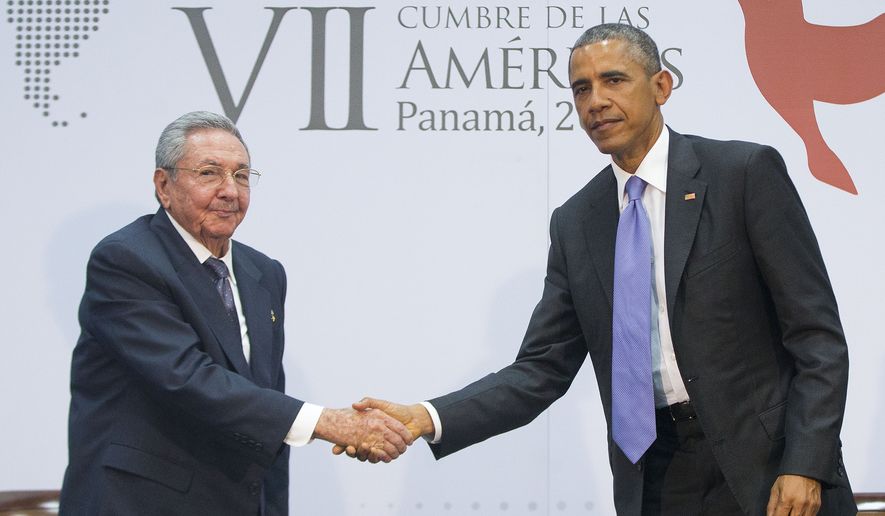The embassies may be reopening, but the embargo will take a lot longer to come down.
President Obama paired the announcement of renewed diplomatic ties with Havana at the White House Wednesday with a call for Congress to end the economic embargo, but U.S. business groups anxious to crack the Cuban market say it’s already clear the economic track will lag behind the political one for the president. Cuban President Raul Castro underscored the point himself Wednesday.
“There could be no normal relations between Cuba and the United States as long as the economic, commercial and financial blockade continues to be fully implemented,” Mr. Castro said.
But, without the approval of Congress, Obama cannot lift the economic embargo currently levied against Cuba. Many in Congress, both Republican and Democrat, are opposed to restoring diplomatic ties with the Communist island nation.
The dissenters cite the Cuban government’s human rights violations, harboring of American fugitives, and seizure of American-owned property without compensation. Even the president’s embassy move is in jeopardy, as Congress must approve any public spending on the American embassy in Havana.
Public opinion, on the other hand, seems to be embracing the changes. According to a survey conducted by the Chicago Council on Global Affairs, two in three Americans support ending the trade embargo.
SEE ALSO: Obama announces opening of U.S. embassy in Cuba
Alana Tummino, director of policy at the Americas Society and Council of the Americas, said reopening the embassy is “a step in the right direction” for addressing Cuba’s human rights violations and other issues. In an interview Ms. Tummino said having diplomatic relations with Cuba will “give us a formal avenue to engage Cuba on these issues,” leading to more progress.
American businesses have already benefited from the thaw in relations and loosening of regulations.
Airbnb, Netflix and other companies have been granted the ability to launch private businesses that bypass state monopolies. After travel laws were loosened, Cuba saw a flood of American tourism which led the nation to grant unprecedented privatization to the service industry.
American business owners will look to capitalize on the ripe, untapped market of a newly opened nation. A coalition of major U.S. companies, such as Cargill and Procter & Gamble, have lent their support to Engage Cuba, a group lobbying Congress for the normalization of US-Cuba relations.
Ms. Tummino also expects some instability as Cuba navigates the global marketplace. “There will be a lot of push and pull as Cuba tries to maintain a socialist economy while opening up to the international market,” she said.
Richard Feinberg, a specialist on Latin America at the Brookings Institution, said both countries will now begin “the hard work” of setting specific rules for increased commerce and travel.
SEE ALSO: Obama signs trade legislation; Boehner, McConnell miss White House event
“Expectations are running high, especially in Cuba, that diplomatic engagement will catalyze economic betterment on the island,” Mr. Feinberg said. “To stimulate more travel and trade, the U.S. government needs to clarify rules for engaging with the emerging Cuban private sector, and make it clear to U.S. banks that they are permitted to support the use of credit cards by U.S. visitors in Cuba.”
He added, “The administration should also begin to consider another round of liberalizing initiatives, some under consideration in the U.S. Congress, to further relax travel restrictions, and to enable more U.S. firms — beyond agriculture and medicines — to assist the Cuban people.”
Ron Christaldi, chairman of the Greater Tampa Area Chamber of Commerce, said the business significance of the embassy opening should not be underestimated.
“The culture of our government had changed and you could feel that energy in the Cubans as well. I believe this is a very significant momentum step in the direction of full normalization and that’s big for us as a region here,” Mr. Christaldi said in a statement.
• Andrew Nachemson can be reached at anachemson@washingtontimes.com.




Please read our comment policy before commenting.